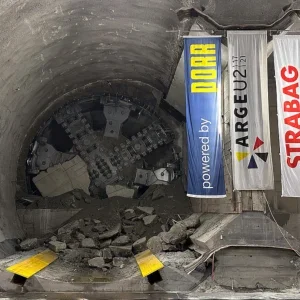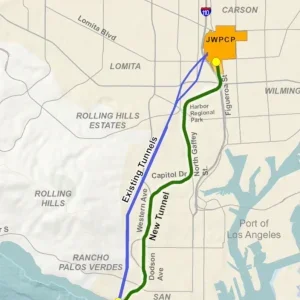Excavation of the twin bores for the Pajares rail tunnel in Spain is more than half complete, and the first of five TBMs recently completed its drive for the US$1.89bn project.
The client, Administrador de Infraestructuras Ferroviarias (ADIF), noted that boring was 53% complete on the occasion of the hard rock NFM machine having finished its drive on Lot 1. The 9.88m diameter TBM had erected 6565 rings over 9847m in 20 months despite prolonged downtime due to complex geology, including groundwater and methane. The remainder is being driven by conventional methods.
A 9.9m diameter Herrenknecht TBM is driving the parallel tube on Lot 1 for the same contractor – a JV of FCC and Acciona – also from the south portal. The single shield machine was about to finish its drive, having achieved a best weekly advance of 216m through sandstone, slate and limestone.
Both manufacturers have second TBMs at Pajares. By early July the second Herrenknecht machine had bored 6171m of the total 14.4km it has to excavate on Lot 2 in the middle of the scheme. The JV contractor Dragados/Obras Subterraneas had achieved a best weekly advance of 208.5m. The 10.16m diameter double shield TBM started boring a long access tunnel in September 2005 – the JV’s alternative to building two 600m deep shafts – and poor ground with heavy groundwater caused two periods of delay last year. The machine will build two parallel stretches, each 3.9km long, of running tunnel.
The second 9.88m diameter NFM machine is working on Lot 3, which is the east tunnel in the centre portion of the rail tunnel scheme. The contractor is a JV of Ferrovial Agroman, Sacyr and Cavosa and set the first ring for the 10.3km long tube in March 2006.
The fifth TBM is a 10m diameter machine designed by Robbins and manufactured by MHI-Duro Felguera in Spain. While driving the west tunnel next to the second NFM machine, the single shield TBM is on Lot 4 of the project and by early last month had excavated some 850m. The TBM was launched a year ago by the JV contractor, which includes Constructuora Hispanica, Azvi, Brues y Fernandez, and Copcisa, and recently achieved an average daily advance rate of 15m.
The 49.5km long Pajares rail bypass includes 24.7km in total of twin tunnels. While the TBMs are driving much of the 8.5m i.d. tunnels, the contractors are also using conventional techniques for a substantial length of the scheme.
The Leon-Astrurias scheme is part of the high-speed network project being built by ADIF.
One of the two NFMs being used on the Pajares rail tunnels







